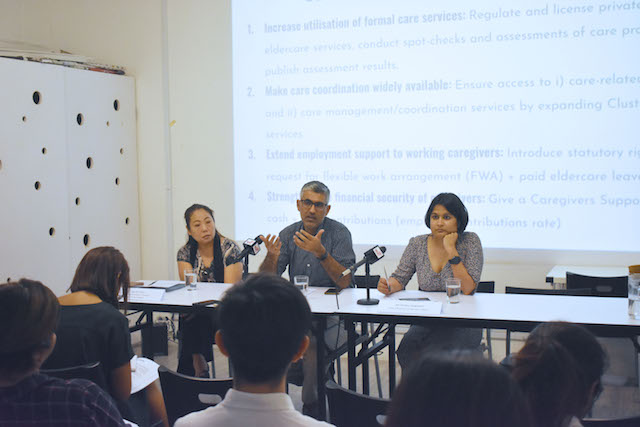-
Advocacy Theme
-
Tags
- Abortion
- Adoption
- Caregiving
- CEDAW
- Disability
- Domestic Violence
- Domestic Workers
- Harassment
- Healthcare
- Housing
- International/Regional Work
- Maintenance
- Media
- Migrant Spouses
- Migrant Workers
- Muslim Law
- National budget
- Parental Leave
- Parenthood
- Polygamy
- Population
- Race and religion
- Sexual Violence
- Sexuality Education
- Single Parents
- Social Support
- Sterilisation
- Women's Charter
AWARE urges six days of paid eldercare leave, right to request flexible work arrangements, and support grant to improve family caregivers’ retirement adequacy
September 18th, 2019 | News, Older People and Caregiving, Press Release
This post was originally published as a press release on 18 September 2019.
To ensure that the retirement readiness of family caregivers of older persons is not compromised by caregiving, gender-equality group AWARE recommends that caregivers who are still working are given six days of paid eldercare leave and the statutory right to flexible work arrangements; and those who are not working be supported through a CPF and cash grant.
These recommendations were announced today as AWARE launched its latest research report, Make Care Count, which investigates the financial toll that eldercare takes on family caregivers. The report is based on in-depth interviews with 22 family caregivers and validation interviews with 22 stakeholders, including eldercare service providers, academics, and medical social workers.
As caregiving is associated with certain unequal gender norms, more women than men tend to undertake this work. Accordingly, the caregiver respondents featured in “Make Care Count” were all female. They were aged 45-65, without children under the age of 21, and caring for someone older than 65 (typically a parent).
For many older persons in Singapore, being cared for by a family member is a way to age in place, i.e. without being moved into a facility. However, AWARE’s findings show that these caregiving responsibilities compromise a caregiver’s ability to continue working, decreases her income (respondents with employment changes suffered a 63% average loss in income), and expands out-of-pocket care-related expenses to a significant portion of her monthly household income.
Besides paid leave, the right to request flexible work arrangements and the grant (which could match prevailing CPF contribution rates for employers and the salaries of paid care workers), AWARE’s other recommendations include more comprehensive regulation and licensing of private providers of eldercare services, and modifications to Singapore’s CareShield Life long-term insurance scheme.
Ms Shailey Hingorani, AWARE’s Head of Research and Advocacy, said, “Given Singapore’s imminent demographic changes, and the growing family caregiving burden that individuals can expect to face, more action in this arena would be very timely. The filial piety demonstrated by family caregivers is truly something to admire – but we should recognise that devotion alone is not sustainable. It needs to be supported by more concrete assistance from the state.”
“Data on the amount of money spent by family caregivers on providing care and support to their older family members is largely lacking in Singapore,” noted Dr Rahul Malhotra, Assistant Professor and Head of Research at Centre for Ageing Research and Education, Duke-NUS Medical School. “This qualitative study contributes in filling an important gap in the research on caregivers of older persons in Singapore.”
Dr Malhotra added that more research on eldercare’s financial impact would be productive and valuable. “Future research studies should strive to estimate both the direct and indirect costs associated with family caregiving using quantitative methods in larger, representative samples of family caregivers.”
Ms Kris Foo, a primary caregiver to her 86-year-old mother, said, “Being single, the role of caregiver in my family has inevitably fallen upon my shoulders. Yet as my savings are used up, and my livelihood threatened, in caring for my mum, I worry about my own ability to age comfortably. I am unsure if I can sustain my self-employment in the years to come, to finance my own future care. Hence, I would appreciate more financial support in the form of caregiver grants.”
Next month, AWARE is organising a public launch for its Make Care Count report at National Volunteer & Philanthropy Centre’s A Good Space. The free event is entitled “Make Care Count… in the National Budget”, and will take place on Saturday 5 October, 2019—shortly after the International Day of Older Persons on 1 October. Participants will be invited to devise care-related recommendations for AWARE to include in its submission to the National Budget in January 2020.
The full Make Care Count report can be read here.
Photograph by Kaspen Paraskakis Narayan.




